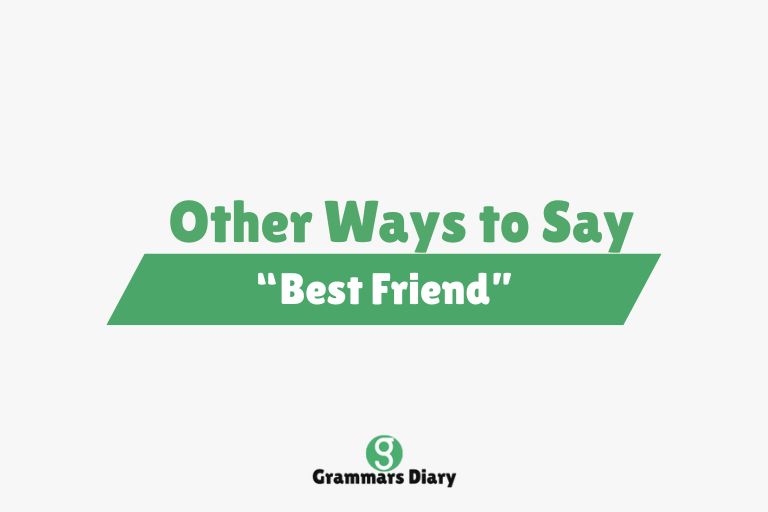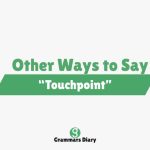“Best friend” is a term we all know and use to describe the person we feel closest to, the one who knows us best and stands by us through both the good and the difficult moments of life. Whether you’re talking about a childhood companion, a ride-or-die confidant, or simply the one person you trust more than anyone else, the phrase “best friend” carries deep emotional weight.
Still, as with many commonly used expressions, there are plenty of alternative ways to describe this special person — each variation bringing its own tone, feeling, or context. This post explores 22 different expressions you can use instead of “best friend,” giving you new vocabulary to express connection, loyalty, and emotional closeness in both everyday and more nuanced conversations.
Other Ways to Say “Best Friend”
1. Closest Companion
Example: “She’s been my closest companion since high school.”
Meaning: A person with whom you share a deeply personal and long-standing relationship built on trust, shared experiences, and emotional intimacy.
Usage: Suitable for both formal and casual settings, especially when emphasizing emotional closeness.
2. Soul Sister / Soul Brother
Example: “He’s my soul brother — we just get each other without saying a word.”
Meaning: Someone whose connection with you feels destined or spiritually aligned, as if your souls are linked by more than just friendship.
Usage: Common in emotional or heartfelt contexts, often used to describe deep, intuitive friendships.
3. Ride or Die
Example: “She’s my ride or die — always has my back no matter what.”
Meaning: A fiercely loyal friend who will stick by you through anything, even the hardest or riskiest situations.
Usage: Popular in modern, informal language, especially in pop culture or social media.
4. Partner in Crime
Example: “We’ve been partners in crime since kindergarten.”
Meaning: A playful phrase describing someone you share mischief, adventures, or fun secrets with.
Usage: Great for humorous or lighthearted conversations; often used to show shared history or mischief.
5. True Blue Friend
Example: “A true blue friend like her is rare and priceless.”
Meaning: A deeply loyal, honest, and dependable friend who sticks by you no matter what.
Usage: Suitable for sincere or reflective moments, especially when describing loyalty.
6. Confidant / Confidante
Example: “He’s not just a friend — he’s my confidant.”
Meaning: Someone you trust completely with your secrets, thoughts, and emotions without fear of judgment.
Usage: Often used in more serious or introspective contexts; appropriate for both men and women (“confidant” is gender-neutral, “confidante” is typically feminine).
7. Day-One
Example: “She’s my day-one — we’ve been tight since way back.”
Meaning: A friend who has been with you since the very beginning, before success or major life changes.
Usage: Informal slang, frequently used in modern urban language or social media captions.
8. Homie
Example: “No matter where life takes us, he’ll always be my homie.”
Meaning: A close and trusted friend, often someone from your neighborhood or social circle who feels like family.
Usage: Casual and affectionate, commonly used in informal speech and pop culture.
9. Bestie
Example: “Weekend brunch with my bestie is the best therapy.”
Meaning: A fun, lighthearted version of “best friend,” often used affectionately and popularly among younger generations.
Usage: Very common in everyday language, especially in text messages, captions, or casual dialogue.
10. Companion for Life
Example: “She’s more than a friend — she’s my companion for life.”
Meaning: Someone you expect to be part of your life journey indefinitely, who stands with you through thick and thin.
Usage: Ideal for sentimental writing or meaningful speeches that express long-term commitment.
11. Forever Friend
Example: “No matter how far apart we are, she’ll always be my forever friend.”
Meaning: A friend you know will be in your life forever, despite distance, time, or life changes.
Usage: Great for emotional expressions in cards, notes, or storytelling.
12. Lifelong Ally
Example: “He’s been my lifelong ally, supporting me through every challenge.”
Meaning: A friend who not only stands by you but actively supports and defends you throughout your life.
Usage: Best used in serious or heartfelt situations, especially when referring to a friendship that has endured through many phases of life.
13. BFF (Best Friends Forever)
Example: “We’ve been BFFs since our school days.”
Meaning: An acronym that stands for “Best Friends Forever,” conveying a sense of unbreakable friendship and long-lasting emotional closeness.
Usage: Often used informally in conversations, text messages, and social media among young people or in playful tone.
14. Trusted Sidekick
Example: “He’s always been my trusted sidekick through every crazy plan I’ve had.”
Meaning: A dependable friend who supports you in your endeavors and often joins you in adventures or tasks.
Usage: Appropriate in friendly or humorous storytelling where you want to highlight loyalty and teamwork.
15. Main One
Example: “When things get real, she’s the main one I call.”
Meaning: The most important person in your friend circle, the one you depend on the most.
Usage: Informal and modern, used in conversations where the priority of the friend is being emphasized.
16. Number One
Example: “He’s my number one — always there, always real.”
Meaning: Your top friend, the one you consider closest and most valuable in your life.
Usage: Simple and clear, often used in casual speech or to express strong personal preference.
17. Rock
Example: “She’s my rock — the one who keeps me grounded.”
Meaning: A steady and supportive presence in your life, someone who provides stability and strength.
Usage: Very common in both emotional and everyday contexts when expressing gratitude for someone’s support.
18. Daylight in the Dark
Example: “In my hardest moments, he’s my daylight in the dark.”
Meaning: A metaphorical expression for a friend who brings hope and light during difficult times.
Usage: Poetic and emotionally powerful, often used in speeches, writing, or personal reflections.
19. Kindred Spirit
Example: “We’re kindred spirits — we just click on every level.”
Meaning: A person who shares the same values, thoughts, or emotional temperament as you.
Usage: Perfect for describing deep and spiritual connections; often used in literature or heartfelt conversations.
20. Chosen Family
Example: “We’re not related by blood, but she’s my chosen family.”
Meaning: A friend so close that they’ve become like family by choice, not genetics.
Usage: A powerful term for expressing deep emotional bonds beyond traditional definitions of friendship.
21. Anchor
Example: “He’s my anchor — keeps me from drifting when life gets tough.”
Meaning: Someone who helps keep you grounded, emotionally stable, and steady through life’s challenges.
Usage: Metaphorical but commonly used in serious or meaningful conversations about support and reliability.
22. Human Diary
Example: “She’s my human diary — she knows everything about me.”
Meaning: A friend you can tell everything to without fear of judgment, who holds your secrets and memories.
Usage: Often used humorously or affectionately to highlight how open and close the friendship is.
When to Use Different “Best Friend” Alternatives
In Formal Writing or Speeches
In professional writing, emotional tributes, or heartfelt speeches — such as at a wedding, memorial, or awards ceremony — phrases like “lifelong ally,” “companion for life,” or “kindred spirit” can provide a deeper emotional resonance and express long-lasting respect.
In Casual or Playful Conversations
For daily talk, texting, or social media posts, lighter alternatives like “bestie,” “BFF,” “ride or die,” or “homie” feel more relatable and fun, offering a sense of personality without sounding too serious or sentimental.
In Social Media Captions or Creative Writing
When writing creatively or captioning photos, metaphoric or poetic terms like “anchor,” “human diary,” or “daylight in the dark” can bring warmth and emotional impact, helping readers feel the depth of your connection without using the basic term “best friend.”
Conclusion
The term “best friend” is beloved for good reason — it’s simple, powerful, and universally understood. But sometimes, whether you’re writing a caption, penning a speech, or just expressing your feelings, using a different phrase can make your message feel more personal, poetic, or precise. By exploring these 22 different ways to say “best friend,” you’ll have a richer vocabulary to describe the unique bond you share with those rare individuals who truly matter.
From playful words like “bestie” and “partner in crime” to more emotional expressions like “chosen family” or “kindred spirit,” each alternative helps you capture a different angle of friendship — one of life’s most valuable treasures.
FAQs
What does “best friend” mean?
A best friend is someone you trust deeply, share a strong emotional connection with, and often rely on for support, laughter, and honesty.
Are all these alternatives interchangeable?
Not always. While many can replace “best friend,” each one carries its own connotation — some are more serious, poetic, or playful than others, so it’s important to match the word to your tone or context.
Is it okay to use slang like “ride or die” in formal writing?
It’s generally better to avoid slang in formal writing, but it can add personality and relatability in casual writing, storytelling, or creative content.











